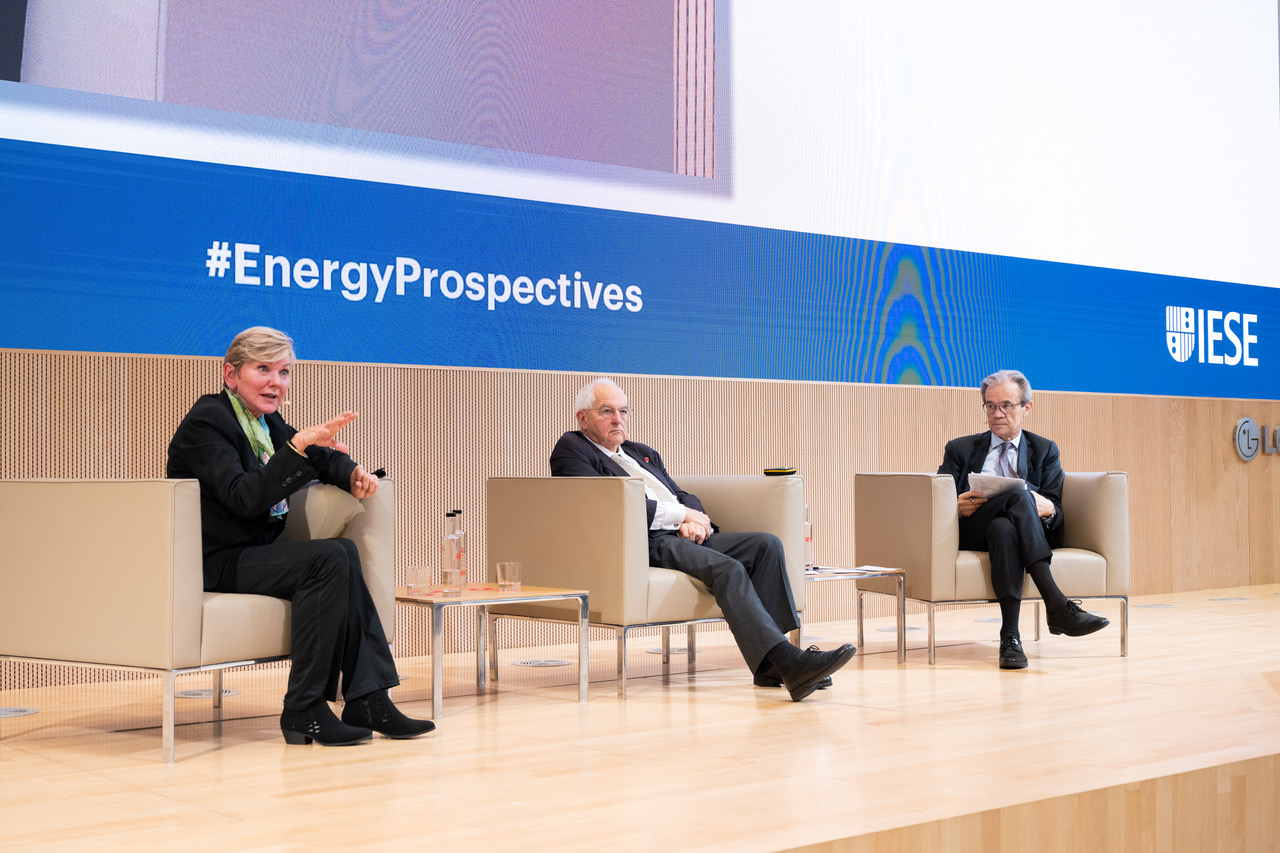Granholm and Wolf agree that the energy transition is moving forward but is complicated by the global political scenario
The former Secretary of the US Department of Energy and the deputy editor and economics columnist of the Financial Times were the protagonists of a new edition of the Energy Prospectives series of conferences organised by the Naturgy Foundation and IESE.

Jennifer M. Granholm, former Secretary of the US Department of Energy, and Martin Wolf, deputy editor and economics columnist for the Financial Times, have taken part in a new edition of the high-level conference series Energy Prospectives organised by the Naturgy Foundation and IESE Business School. In this 21st edition, the guests discussed the state of the world economy and its implications for the future of energy.
Jennifer M. Granholm began her speech by giving a message of hope about the direction the energy sector is taking, that “despite this huge increase in demand” driven, among other factors, by artificial intelligence, predictions indicate that “we’re going to meet that demand”. She further stated that the European Union added about 60 gigawatts of capacity to the grid last year, a figure similar to that of the United States, and the Americans are expected to add around 230 gigawatts of additional capacity by 2030.
Granholm also expressed a vision of the future where “the modernisation of electricity grids and the role of artificial intelligence will be decisive”. “Household electricity bills are expected to increase by around 20% by 2030, partly due to necessary investments in distribution and transmission, in a context where effective grid capacity is only around 15%”.
In the final statements of her presentation she emphasised that “if we can leverage grid optimisation technologies and artificial intelligence-based tools to better direct energy flows, we could squeeze so much more out of the existing grid, reducing the need for new installations”. She concluded by stating that “although there are bottlenecks in the US and the EU in terms of permits and deadlines, AI can greatly speed up electricity system operation”.
Martin Wolf stressed that “there is a genuine energy revolution going on, but from the climate point of view it’s going to be too slow. And given the election results in American and the current administration, it’s got slower. We are actually going through a revolutionary moment in world economic and political history. The transformation of the US role in the world, not necessarily forever, but I don’t think we will go back to the status quo ante. The emergence of an absolutely clear superpower rivalry particularly in their trade war, which in my perspective China won, certainly didn’t lose”.
Wolf said they are watching with concern “as the international order is increasingly upended by the rise of populism, a phenomenon that has historically proven to be very damaging to economies. If this revolution takes its course, its effects will be very negative for the economic outlook and will have major political consequences”. He also highlighted the role taken on by the Trump administration in this second term, in which “it has absorbed the entire administration practically, it has been aggressive vis-a-vis reasoned science and is seeking to turn its allies into vassals. This exploitative superpower behaviour, coupled with China’s equally predatory stance, using its role as a supplier of essential imports to the world, will shape a much more hostile and complex international environment, especially for Europe”.
The deputy editor of the Financial Times ended his speech by talking about the economic and financial uncertainties that “are exacerbated by the adoption of trade policies based on discriminatory, variable, unpredictable and instable tariffs, which is bound to make trade decision-making by businesses very difficult and it will slow the world economy in the long term”. On the other hand, Wolf stressed that “there is a real risk of a very severe fall in world trade. I don’t think that will stop growth but it will affect underlying economic growth in the world”. When speaking of the impact this situation will have in terms of energy, he highlighted the fact that temperatures continue to rise, already reaching 1.5 ºC above pre-industrial levels.
To open the session, Rafael Villaseca, chairman of the Naturgy Foundation, highlighted its commitment to social initiatives such as the promotion, analysis and dissemination of knowledge about the world of energy. “Our goal is to enrich society and support better decision-making in this strategic sector through conferences, seminars, workshops and publications that examine energy from multiple perspectives,” he said.
“The European Union and the United States have long maintained different positions regarding energy challenges. However, these differences have become much more pronounced under the current US policy, while significant fractures can also be observed within Europe’s stance. It is difficult to imagine a scenario in which such opposing positions could coexist. All of this, of course, carries major economic and geostrategic consequences. Something will have to change, and soon, since it seems unlikely that climate targets will be met, nor is there any clarity about the new order of energy markets with which governments and companies will have to contend. To shed light on these issues, few figures could be more qualified than our two distinguished guests today,” concluded Villaseca.
Share